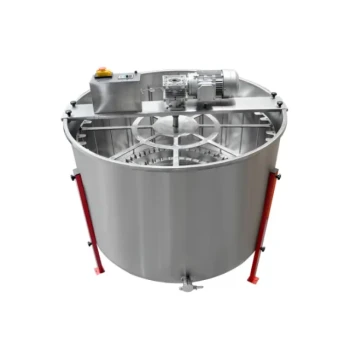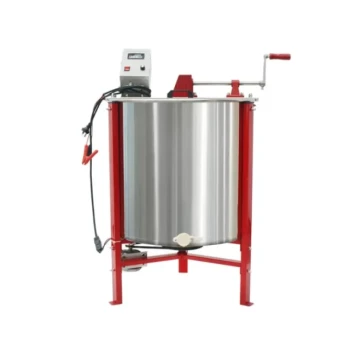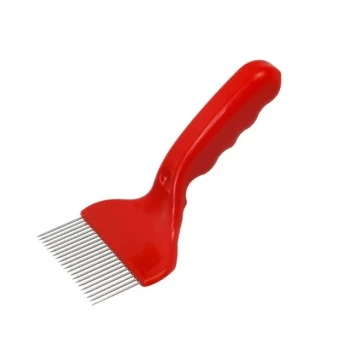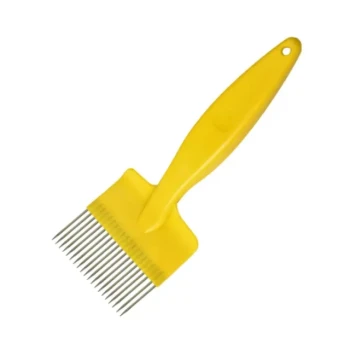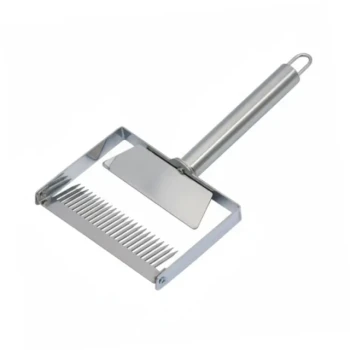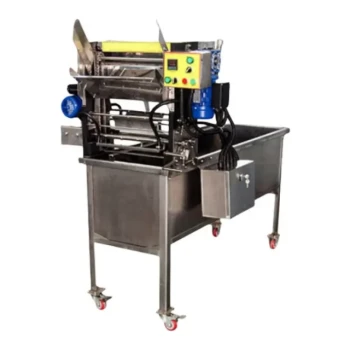Virtually all standard beehive frames are designed to be compatible with a honey extractor. The most common types, including Langstroth, Dadant, and British Standard frames, will work perfectly, as will frames made from plastic or wood. The crucial factor isn't the brand or style of the frame, but matching its physical dimensions to the size and type of the extractor machine.
The core principle of compatibility is not the frame type, but its size. You must match your frame dimensions (e.g., Deep, Medium, Shallow) to an extractor specifically built to hold them, paying close attention to whether the machine operates in a radial or tangential configuration.
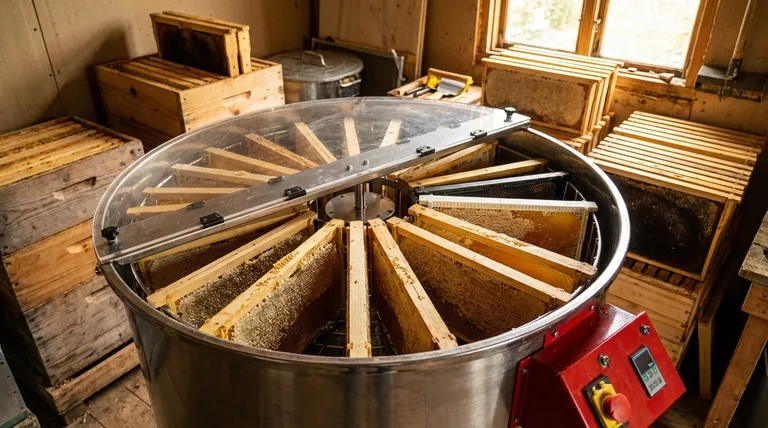
The Core Principle of Compatibility: Size and Orientation
True compatibility goes beyond a simple list of names. It is determined by the physical relationship between your frames and the extractor's internal basket.
Matching Frame Dimensions
An extractor is built to accommodate a maximum frame height. A machine designed for medium or shallow honey supers will not fit the taller "deep" frames often used in brood boxes. Always verify the extractor's specifications to ensure it can hold the specific frame sizes you use.
Tangential vs. Radial Extractors
This is the most important technical distinction. A tangential extractor holds frames flat against the wall of the drum, extracting honey from one side at a time. You must manually flip the frames to extract the second side.
A radial extractor holds frames like spokes on a wheel. Centrifugal force pulls honey from both sides simultaneously, making it significantly faster. However, the frame's top bar must be shorter than the extractor's diameter for it to fit.
Common Compatible Frame Standards
Manufacturers design extractors to fit the most widely adopted standards in beekeeping. This includes:
- Langstroth Frames: The dominant standard in North America.
- Dadant Frames: Taller and wider than Langstroth, common in commercial operations.
- British Standard Frames: The most common size used in the United Kingdom.
- Plastic Frames: These are simply a material choice and are made to standard dimensions like Langstroth. They are fully compatible.
Choosing an Extractor Based on Your Operation
The right machine depends entirely on your scale and goals. The primary difference is the method of power and the orientation of the frames.
Manual Extractors
These are powered by a hand crank and are almost always tangential in design. They are the most affordable option, making them ideal for beekeepers with only a few hives. Their primary drawback is the significant physical effort and time required for extraction.
Electric Extractors
Powered by a motor, these machines dramatically reduce labor and increase speed. They can be either tangential or radial and are the standard for any beekeeper moving beyond a small hobbyist scale. An electric extractor can process anywhere from 2 to over 100 frames per cycle, depending on its size.
The Power of Radial Design
For medium to large-scale operations, a radial extractor is the superior choice. By extracting honey from both sides of multiple frames at once, it maximizes yield and drastically cuts down on processing time, which is critical when harvesting from many hives.
Understanding the Trade-offs and Key Features
Investing in an extractor requires balancing cost, efficiency, and longevity. Misunderstanding these trade-offs is a common pitfall for new beekeepers.
The Cost vs. Efficiency Balance
A manual extractor is a low-cost entry point, but your time and labor are the hidden costs. An electric radial extractor is a significant upfront investment, but it can pay for itself quickly in saved hours and reduced physical strain for a growing apiary.
Material Matters: Stainless Steel
Always prioritize extractors made from food-grade stainless steel. It is durable, rust-resistant, and easy to clean, ensuring the quality and safety of your honey. Cheaper models made from coated steel or plastic are prone to damage and can be difficult to sanitize properly.
Capacity and Throughput
An extractor's capacity is listed by the number of frames it can hold (e.g., a "4-frame extractor"). Consider not just how many hives you have now, but how many you plan to have. Buying a slightly larger machine than you currently need is often a wise investment.
Making the Right Choice for Your Apiary
To select the correct extractor, match the technology to the scale of your beekeeping.
- If you are a hobbyist with 1-3 hives: A small, 2-to-4-frame manual tangential extractor is the most cost-effective and practical solution.
- If you manage a growing apiary of 4-10 hives: An electric tangential or a small electric radial extractor will provide a significant return on investment in time and labor.
- If you are running a commercial or large-scale operation: A large-capacity electric radial extractor is the only tool that can efficiently handle a large honey harvest.
Ultimately, selecting the right extractor is a direct investment in the efficiency and long-term success of your beekeeping.
Summary Table:
| Frame Type | Primary Use | Key Compatibility Consideration |
|---|---|---|
| Langstroth | North America (Standard) | Match frame depth (Deep, Medium, Shallow) to extractor specs. |
| Dadant | Commercial Operations | Taller frames; requires an extractor with sufficient height capacity. |
| British Standard | United Kingdom | Ensure the extractor basket is designed for this specific size. |
| Plastic Frames | All Levels (Material) | Must conform to a standard dimension (e.g., Langstroth) to be compatible. |
| Extractor Type | Best For | How It Works |
| Tangential | Hobbyists / Manual Use | Frames are flat; honey is extracted from one side at a time. |
| Radial | Medium/Large-Scale Operations | Frames are like spokes; honey is extracted from both sides simultaneously. |
Streamline Your Honey Harvest with the Right Equipment
Choosing the correct extractor is crucial for the efficiency and profitability of your operation. Whether you manage a few hives or a large commercial apiary, HONESTBEE supplies the durable, high-performance beekeeping equipment you need.
We provide commercial apiaries and beekeeping equipment distributors with wholesale-focused solutions, including stainless steel radial and tangential extractors designed to handle standard frame types.
Let us help you maximize your yield and minimize your labor. Contact HONESTBEE today to discuss your specific needs and get a quote on the right extractor for your business.
Visual Guide
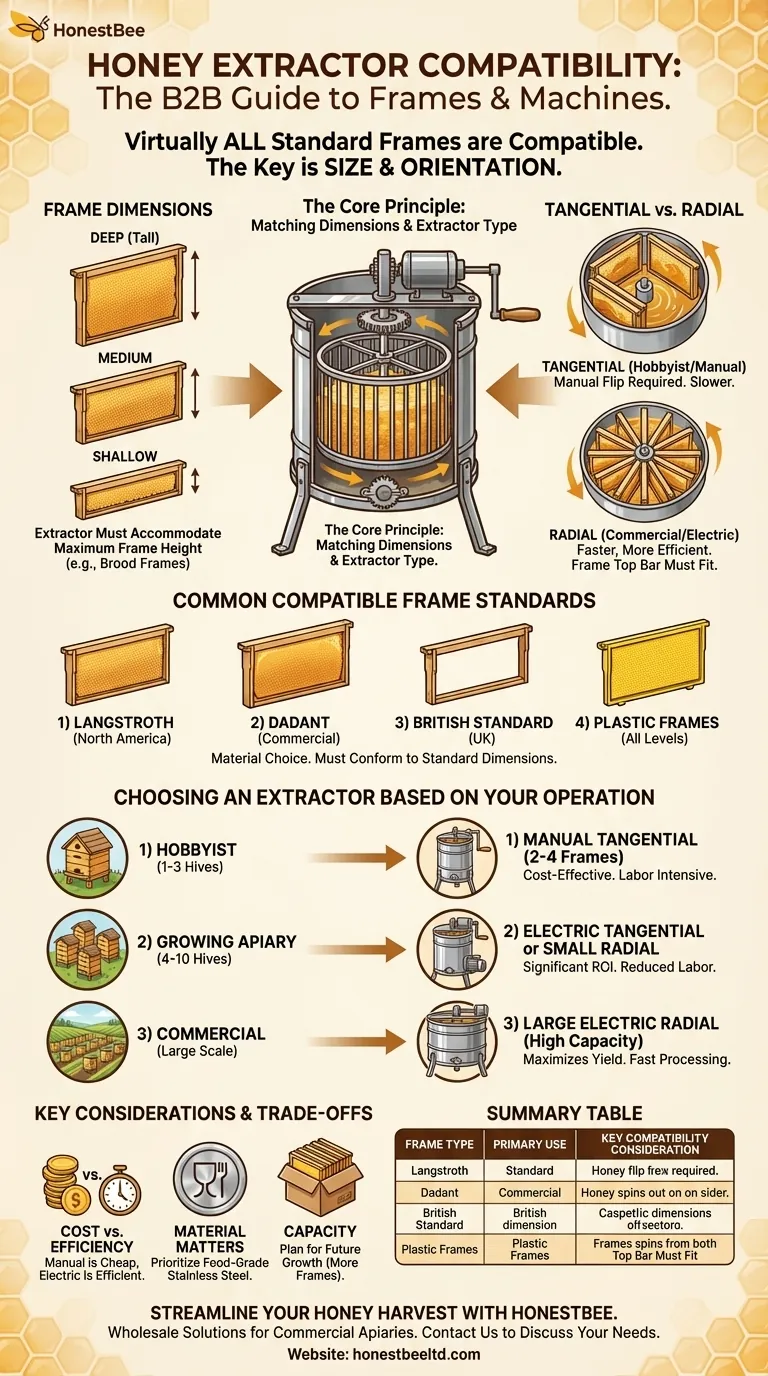
Related Products
- HONESTBEE 72 Frame Industrial Electric Honey Extractor for Beekeeping
- HONESTBEE 3-Frame Manual Acrylic Honey Extractor
- electric honey extractor honey centrifuge 3 frame honey extractor stainless steel honey frame extractor
- 24 Frame Honey Extractor Commercial Radial Honey Frame Extraction Machine
- 6 Frame Manual Stainless Steel Honey Extractor Beekeeping Equipment
People Also Ask
- Can a manual extractor be upgraded to an electric one? Save Labor & Boost Efficiency
- What equipment do you need to process honey? A Complete Guide for Every Scale of Operation
- What are the main types of honey extractor machines? A Guide for Beekeepers
- What are the advantages of automated honey extractors in terms of time efficiency? Boost Your Harvest Speed
- Why is preserving honeycomb integrity important, and how do automated extractors help? Boost Hive Health & Honey Yields









